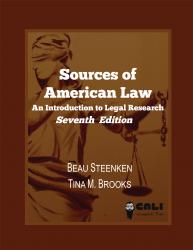מעודכן ל: 14.8.2024
 Sources of American Law: An Introduction to Legal Research
by
At its most basic definition the practice of law comprises conducting research to find relevant rules of law and then applying those rules to the specific set of circumstances faced by a client. However, in American law, the legal rules to be applied derive from myriad sources, complicating the process and making legal research different from other sorts of research. This text introduces first-year law students to the new kind of research required to study and to practice law. It seeks to demystify the art of legal research by following a “Source and Process” approach. First, the text introduces students to the major sources of American law and describes the forms the various authorities traditionally took in print. After establishing this base, the text proceeds to instruct students on the methods they will most likely use in practice, namely electronic research techniques and the consultation of secondary sources. Sources of Law incorporates screencasts currently hosted on YouTube that actively demonstrate the processes described in the static text. Finally, the text illustrates how the different pieces come together in the legal research process.
Sources of Law focuses on realistic goals for 1Ls to learn in a relatively small amount of instruction time, and so focuses mainly on the basics. It does introduce some advanced material so that 1Ls can recognize pieces of information they may encounter in research, but it does not fully cover researching materials outside the scope of the traditional 1L course. As such, it is best-suited for introductory legal research courses for 1Ls.
What's New in the Seventh Edition: There are two substantive additions. There is now a glossary of terms at the end of the book, which we hope will be useful to first year students trying to get a handle on all the new vocabulary they encounter in law school. The second addition is a brief section towards the end of Chapter 2 on generative AI.
Sources of American Law: An Introduction to Legal Research
by
At its most basic definition the practice of law comprises conducting research to find relevant rules of law and then applying those rules to the specific set of circumstances faced by a client. However, in American law, the legal rules to be applied derive from myriad sources, complicating the process and making legal research different from other sorts of research. This text introduces first-year law students to the new kind of research required to study and to practice law. It seeks to demystify the art of legal research by following a “Source and Process” approach. First, the text introduces students to the major sources of American law and describes the forms the various authorities traditionally took in print. After establishing this base, the text proceeds to instruct students on the methods they will most likely use in practice, namely electronic research techniques and the consultation of secondary sources. Sources of Law incorporates screencasts currently hosted on YouTube that actively demonstrate the processes described in the static text. Finally, the text illustrates how the different pieces come together in the legal research process.
Sources of Law focuses on realistic goals for 1Ls to learn in a relatively small amount of instruction time, and so focuses mainly on the basics. It does introduce some advanced material so that 1Ls can recognize pieces of information they may encounter in research, but it does not fully cover researching materials outside the scope of the traditional 1L course. As such, it is best-suited for introductory legal research courses for 1Ls.
What's New in the Seventh Edition: There are two substantive additions. There is now a glossary of terms at the end of the book, which we hope will be useful to first year students trying to get a handle on all the new vocabulary they encounter in law school. The second addition is a brief section towards the end of Chapter 2 on generative AI.
לפניות והערות כתבו ל:irinabo@savion.huji.ac.il
מעודכן ל: 14.8.2024
כל האזכורים של מקורות יש לאזכר לפי כללי האזכור האחיד והבלובוק. סרטוני הדרכה על אזכור חקיקה ופסיקה.
|